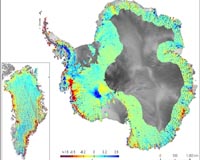| . |  |
. |
New York (UPI) Sep 8, 2010 U.S. scientists say Earth's last ice age, about 13,000 years ago, saw Europe freezing while the antarctic was warming up, an anomaly that has long puzzled them. Researchers at Columbia University, in a study published in the journal Nature, say new evidence from New Zealand suggests the deep freeze up north bypassed much of the Southern Hemisphere. "Glaciers in New Zealand receded dramatically at this time, suggesting that much of the Southern Hemisphere was warming with Antarctica," study author Michael Kaplan, a geochemist at Columbia's Lamont-Doherty Earth Observatory, said. "Knowing that the cooling in the Northern Hemisphere was not a global event brings us closer to understanding how Earth finally came out of the ice age." Ice core data show warming of the Southern Hemisphere starting 13,000 years ago coincided with rising levels of the heat-trapping gas carbon dioxide. The new study links this spike in CO2 to the impressive shrinking of glaciers in New Zealand. Scientists estimate the glaciers shrank by half over 1,000 years in response to the local climate warming as much as 2 degrees F. Researchers theorize that a weakening Gulf Stream at the start of the last ice age drove the north into freezing temperatures while simultaneously affecting the planet's wind patterns and ocean currents, pushing warm air and seawater south.
earlier related report "We used satellite images to analyse the response of glaciers at the summit of Mount Ararat to climate change," geologist Mehmet Akif Sarikaya told AFP. "The glacier surface area decreased from eight square kilometres (3.04 square miles) in 1976 to 5.5 square kilometres (2.09 square miles) in 2008, a loss of about seven hectares (17 acres) a year," said Sarikaya, an assistant professor at Istanbul's Fatih University, who also lectures at the University of Omaha, Nebraska. The scientist warned that temperature change might eventually threaten the very existence of the ice fields. "We sought the reasons for the melting and found that the temperature had increased by 0.03 degrees Celsius (0.05 degrees Fahrenheit) per year" during the period studied, he said. Other factors, such as increased precipitation, sunshine or topography, might have also contributed to the glacial loss, he added. Sarikaya said he was unable to comment on the causes of climate change around Mount Ararat. Previous research has found accelerating glacier erosion in the European Alps and South American Andes, and attributed the loss to man-made global warming. The Book of Genesis says God decided to flood the Earth after seeing how corrupt it had become, and told Noah to build an Ark and fill it with two of every species. After the waters receded, the Ark came to rest on a mountain that believers contend is Mount Ararat, at 5,137 metres (16,853 feet) the country's highest peak. Many teams have scoured the mountain to find the Ark, without any convincing results so far. Sarikaya declined to comment on whether the melting of the glaciers would provide new opportunities in the search.
Share This Article With Planet Earth
Related Links Beyond the Ice Age
 Climate: New study slashes estimate of icecap loss
Climate: New study slashes estimate of icecap lossParis (AFP) Sept 7, 2010 Estimates of the rate of ice loss from Greenland and West Antarctica, one of the most worrying questions in the global warming debate, should be halved, according to Dutch and US scientists. In the last two years, several teams have estimated Greenland is shedding roughly 230 gigatonnes of ice, or 230 billion tonnes, per year and West Antarctica around 132 gigatonnes annually. Together, ... read more |
|
| The content herein, unless otherwise known to be public domain, are Copyright 1995-2010 - SpaceDaily. AFP and UPI Wire Stories are copyright Agence France-Presse and United Press International. ESA Portal Reports are copyright European Space Agency. All NASA sourced material is public domain. Additional copyrights may apply in whole or part to other bona fide parties. Advertising does not imply endorsement,agreement or approval of any opinions, statements or information provided by SpaceDaily on any Web page published or hosted by SpaceDaily. Privacy Statement |